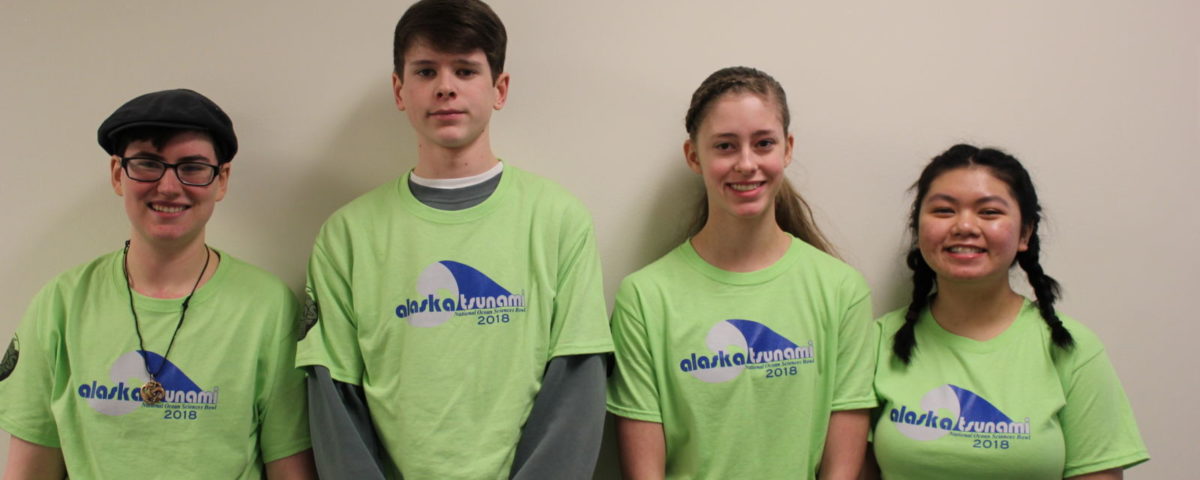Cordova teams win big at Alaska’s Tsunami Bowl

Imagine this:
You’re sitting at a table with three teammates; the opposing team sits at the table next to yours. Both teams sit quietly, facing a judging panel of science experts. The Jeopardy-style buzzer in your hand is starting to get a little sweaty, but you grip it harder as the competition moderator asks the ninth question of the round: Which organism reproduces by shedding gametes into the sea and depends upon the chance union of egg and sperm? You start your thought process—you know this, he just described broadcast spawning. Most invertebrates broadcast spawn, especially ones that aren’t very mobile. The moderator continues, “w. Blue whale; x. Purple sea urchin; y. Octopus; z. Galatheid crab.” Your thumb smashes your buzzer in a race against the other team and the moderator calls out your name. “X,” you say with confidence, making a mental note to thank your coach for being strangely obsessed with marine invertebrates.
The Moderator accepts your answer and gives your team the bonus question: Which organisms form the base of the food chain at hydrothermal vents due to their ability to convert carbon and nutrients into organic matter in the absence of sunlight? This time you can confer with your teammates, everyone leans in to put their heads together. One member shrugs his shoulders; one teammate remembers talking about it at practice, maybe the practice where you watched Blue Planet. You think it is bacteria, but can’t remember the name. Your team captain knows though! She gives her answer to the moderator, “chemosynthetic bacteria.” Yes! Your team has just scored 10 points! No time to celebrate though. There are four minutes left in the round and more questions to answer. Your grip on the buzzer tightens.
The above scenario provides a tiny glimpse into what Cordova’s National Ocean Sciences Bowl teams experienced at the Tsunami Bowl a few weeks ago. Cordova sent two teams to the state-wide competition: Voldetort and The Yeti Crabs. These teams went up against 22 other Alaskan teams in the buzzer rounds (described above) and a research project. The Tsunami Bowl requires teams to complete a research project culminating in a 15-page paper and 15-minute oral presentation. The Cordova teams rocked the competition with their projects. Voldetort’s paper earned them third in the state, and their oral presentation was ranked fifth in the state. Combined, Voldetort’s project was second in the state! The Yeti Crabs’ research paper was awarded first place and combined with their oral presentation score, they won overall best project!
Team project scores are combined with the first day’s round-robin scores to seed all the teams into the final day of competition. The Yeti Crabs and Voldetort each lost one round-robin match, seeding them as #2 and #3 heading into the final day of competition. Voldetort took an unfortunate loss in their first round of the day: a buzzer-beating answer from the opposing team gave them a 2-point lead when time ran out. The Yeti Crabs were a force to be reckoned with and fought their way into the final round of the competition. The final round determines the winner of the Tsunami Bowl, and that team represents Alaska at the National Finals Competition. On stage, in front of 200 people, The Yeti Crabs did it! They beat South Anchorage’s team 66-54 and will be heading to Colorado in April to compete against the winners of the other 23 regional bowls.






